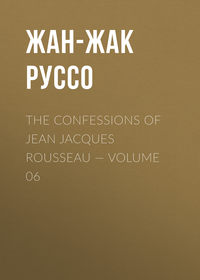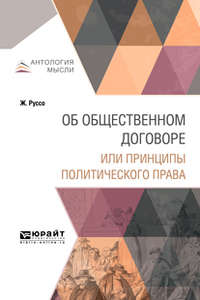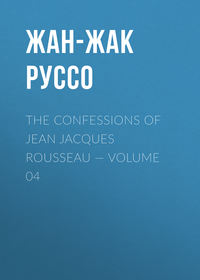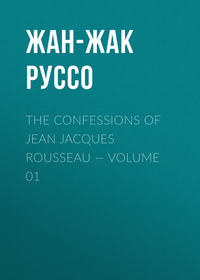 полная версия
полная версияThe Confessions of Jean Jacques Rousseau — Volume 09
Having resolved to conform to an assiduity which was necessary, I immediately and voluntarily entered upon it, and for the first year at least, found it less burthensome than I could have expected. Madam d'Epinay, who commonly passed the summer in the country, continued there but a part of this; whether she was more detained by her affairs in Paris, or that the absence of Grimm rendered the residence of the Chevrette less agreeable to her, I know not. I took the advantage of the intervals of her absence, or when the company with her was numerous, to enjoy my solitude with my good Theresa and her mother, in such a manner as to taste all its charms. Although I had for several years passed been frequently in the country, I seldom had enjoyed much of its pleasures; and these excursions, always made in company with people who considered themselves as persons of consequence, and rendered insipid by constraint, served to increase in me the natural desire I had for rustic pleasures. The want of these was the more sensible to me as I had the image of them immediately before my eyes. I was so tired of saloons, jets d'eau, groves, parterres, and of more fatiguing persons by whom they were shown; so exhausted with pamphlets, harpsichords, trios, unravellings of plots, stupid bon mots, insipid affections, pitiful storytellers, and great suppers; that when I gave a side glance at a poor simple hawthorn bush, a hedge, a barn, or a meadow; when, in passing through a hamlet, I scented a good chervil omelette, and heard at a distance the burden of a rustic song of the Bisquieres; I wished all rouge, furbelows and amber at the d—-l, and envying the dinner of the good housewife, and the wine of her own vineyard, I heartily wished to give a slap on the chaps to Monsieur le Chef and Monsieur le Maitre, who made me dine at the hour of supper, and sup when I should have been asleep, but especially to Messieurs the lackeys, who devoured with their eyes the morsel I put into my mouth, and upon pain of my dying with thirst, sold me the adulterated wine of their master, ten times dearer than that of a better quality would have cost me at a public house.
At length I was settled in an agreeable and solitary asylum, at liberty to pass there the remainder of my days, in that peaceful, equal, and independent life for which I felt myself born. Before I relate the effects this situation, so new to me, had upon my heart, it is proper I should recapitulate its secret affections, that the reader may better follow in their causes the progress of these new modifications.
I have always considered the day on which I was united to Theresa as that which fixed my moral existence. An attachment was necessary for me, since that which should have been sufficient to my heart had been so cruelly broken. The thirst after happiness is never extinguished in the heart of man. Mamma was advancing into years, and dishonored herself! I had proofs that she could never more be happy here below; it therefore remained to me to seek my own happiness, having lost all hopes of partaking of hers. I was sometimes irresolute, and fluctuated from one idea to another, and from project to project. My journey to Venice would have thrown me into public life, had the man with whom, almost against my inclination, I was connected there had common sense. I was easily discouraged, especially in undertakings of length and difficulty. The ill success of this disgusted me with every other; and, according to my old maxims, considering distant objects as deceitful allurements, I resolved in future to provide for immediate wants, seeing nothing in life which could tempt me to make extraordinary efforts.
It was precisely at this time we became acquainted. The mild character of the good Theresa seemed so fitted to my own, that I united myself to her with an attachment which neither time nor injuries have been able to impair, and which has constantly been increased by everything by which it might have been expected to be diminished. The force of this sentiment will hereafter appear when I come to speak of the wounds she has given my heart in the height of my misery, without my ever having, until this moment, once uttered a word of complaint to any person whatever.
When it shall be known, that after having done everything, braved everything, not to separate from her; that after passing with her twenty years in despite of fate and men; I have in my old age made her my wife, without the least expectation or solicitation on her part, or promise or engagement on mine, the world will think that love bordering upon madness, having from the first moment turned my head, led me by degrees to the last act of extravagance; and this will no longer appear doubtful when the strong and particular reasons which should forever have prevented me from taking such a step are made known. What, therefore, will the reader think when I shall have told him, with all the truth he has ever found in me, that, from the first moment in which I saw her, until that wherein I write, I have never felt the least love for her, that I never desired to possess her more than I did to possess Madam de Warrens, and that the physical wants which were satisfied with her person were, to me, solely those of the sex, and by no means proceeding from the individual? He will think that, being of a constitution different from that of other men, I was incapable of love, since this was not one of the sentiments which attached me to women the most dear to my heart. Patience, O my dear reader! the fatal moment approaches in which you will be but too much undeceived.
I fall into repetitions; I know it; and these are necessary. The first of my wants, the greatest, strongest and most insatiable, was wholly in my heart; the want of an intimate connection, and as intimate as it could possibly be: for this reason especially, a woman was more necessary to me than a man, a female rather than a male friend. This singular want was such that the closest corporal union was not sufficient: two souls would have been necessary to me in the same body, without which I always felt a void. I thought I was upon the point of filling it up forever. This young person, amiable by a thousand excellent qualities, and at that time by her form, without the shadow of art or coquetry, would have confined within herself my whole existence, could hers, as I had hoped it would, have been totally confined to me. I had nothing to fear from men; I am certain of being the only man she ever really loved and her moderate passions seldom wanted another not even after I ceased in this respect to be one to her. I had no family; she had one; and this family was composed of individuals whose dispositions were so different from mine, that I could never make it my own. This was the first cause of my unhappiness. What would I not have given to be the child of her mother? I did everything in my power to become so, but could never succeed. I in vain attempted to unite all our interests: this was impossible. She always created herself one different from mine, contrary to it, and to that even of her daughter, which already was no longer separated from it. She, her other children, and grand-children, became so many leeches, and the least evil these did to Theresa was robbing her. The poor girl, accustomed to submit, even to her nieces, suffered herself to be pilfered and governed without saying a word; and I perceived with grief that by exhausting my purse, and giving her advice, I did nothing that could be of any real advantage to her. I endeavored to detach her from her mother; but she constantly resisted such a proposal. I could not but respect her resistance, and esteemed her the more for it; but her refusal was not on this account less to the prejudice of us both. Abandoned to her mother and the rest of her family, she was more their companion than mine, and rather at their command than mistress of herself. Their avarice was less ruinous than their advice was pernicious to her; in fact, if, on account of the love she had for me, added to her good natural disposition, she was not quite their slave, she was enough so to prevent in a great measure the effect of the good maxims I endeavored to instil into her, and, notwithstanding all my efforts, to prevent our being united.
Thus was it, that notwithstanding a sincere and reciprocal attachment, in which I had lavished all the tenderness of my heart, the void in that heart was never completely filled. Children, by whom this effect should have been produced, were brought into the world, but these only made things worse. I trembled at the thought of intrusting them to a family ill brought up, to be still worse educated. The risk of the education of the foundling hospital was much less. This reason for the resolution I took, much stronger than all those I stated in my letter to Madam de Francueil, was, however, the only one with which I dared not make her acquainted; I chose rather to appear less excusable than to expose to reproach the family of a person I loved. But by the conduct of her wretched brother, notwithstanding all that can be said in his defence, it will be judged whether or not I ought to have exposed my children to an education similar to his.
Not having it in my power to taste in all its plentitude the charms of that intimate connection of which I felt the want, I sought for substitutes which did not fill up the void, yet they made it less sensible. Not having a friend entirely devoted to me, I wanted others, whose impulse should overcome my indolence; for this reason I cultivated and strengthened my connection with Diderot and the Abbe de Condillac, formed with Grimm a new one still more intimate, till at length by the unfortunate discourse, of which I have related some particulars, I unexpectedly found myself thrown back into a literary circle which I thought I had quitted forever.
My first steps conducted me by a new path to another intellectual world, the simple and noble economy of which I cannot contemplate without enthusiasm. I reflected so much on the subject that I soon saw nothing but error and folly in the doctrine of our sages, and oppression and misery in our social order. In the illusion of my foolish pride, I thought myself capable of destroying all imposture; and thinking that, to make myself listened to, it was necessary my conduct should agree with my principles, I adopted the singular manner of life which I have not been permitted to continue, the example of which my pretended friends have never forgiven me, which at first made me ridiculous, and would at length have rendered me respectable, had it been possible for me to persevere.
Until then I had been good; from that moment I became virtuous, or at least infatuated with virtue. This infatuation had begun in my head, but afterwards passed into my heart. The most noble pride there took root amongst the ruins of extirpated vanity. I affected nothing; I became what I appeared to be, and during four years at least, whilst this effervescence continued at its greatest height, there is nothing great and good that can enter the heart of man, of which I was not capable between heaven and myself. Hence flowed my sudden eloquence; hence, in my first writings, that fire really celestial, which consumed me, and whence during forty years not a single spark had escaped, because it was not yet lighted up.
I was really transformed; my friends and acquaintance scarcely knew me. I was no longer that timid, and rather bashful than modest man, who neither dared to present himself, nor utter a word; whom a single pleasantry disconcerted, and whose face was covered with a blush the moment his eyes met those of a woman. I became bold, haughty, intrepid, with a confidence the more firm, as it was simple, and resided in my soul rather than in my manner. The contempt with which my profound meditations had inspired me for the manners, maxims and prejudices of the age in which I lived, rendered me proof against the raillery of those by whom they were possessed, and I crushed their little pleasantries with a sentence, as I would have crushed an insect with my fingers.
What a change! All Paris repeated the severe and acute sarcasms of the same man who, two years before, and ten years afterwards, knew not how to find what he had to say, nor the word he ought to employ. Let the situation in the world the most contrary to my natural disposition be sought after, and this will be found. Let one of the short moments of my life in which I became another man, and ceased to be myself, be recollected, this also will be found in the time of which I speak; but, instead of continuing only six days, or six weeks, it lasted almost six years, and would perhaps still continue, but for the particular circumstances which caused it to cease, and restored me to nature, above which I had, wished to soar.
The beginning of this change took place as soon as I had quitted Paris, and the sight of the vices of that city no longer kept up the indignation with which it had inspired me. I no sooner had lost sight of men than I ceased to despise them, and once removed from those who designed me evil, my hatred against them no longer existed. My heart, little fitted for hatred, pitied their misery, and even their wickedness. This situation, more pleasing but less sublime, soon allayed the ardent enthusiasm by which I had so long been transported; and I insensibly, almost to myself even, again became fearful, complaisant and timid; in a word, the same Jean Jacques I before had been.
Had this resolution gone no further than restoring me to myself, all would have been well; but unfortunately it rapidly carried me away to the other extreme. From that moment my mind in agitation passed the line of repose, and its oscillations, continually renewed, have never permitted it to remain here. I must enter into some detail of this second revolution; terrible and fatal era, of a fate unparalleled amongst mortals.
We were but three persons in our retirement; it was therefore natural our intimacy should be increased by leisure and solitude. This was the case between Theresa and myself. We passed in conversations in the shade the most charming and delightful hours, more so than any I had hitherto enjoyed. She seemed to taste of this sweet intercourse more than I had until then observed her to do; she opened her heart, and communicated to me, relative to her mother and family, things she had had resolution enough to conceal for a great length of time. Both had received from Madam Dupin numerous presents, made them on my account, and mostly for me, but which the cunning old woman, to prevent my being angry, had appropriated to her own use and that of her other children, without suffering Theresa to have the least share, strongly forbidding her to say a word to me of the matter: an order the poor girl had obeyed with an incredible exactness.
But another thing which surprised me more than this had done, was the discovery that besides the private conversations Diderot and Grimm had frequently had with both to endeavor to detach them from me, in which, by means of the resistance of Theresa, they had not been able to succeed, they had afterwards had frequent conferences with the mother, the subject of which was a secret to the daughter. However, she knew little presents had been made, and that there were mysterious goings backward and forward, the motive of which was entirely unknown to her. When we left Paris, Madam le Vasseur had long been in the habit of going to see Grimm twice or thrice a month, and continuing with him for hours together, in conversation so secret that the servant was always sent out of the room.
I judged this motive to be of the same nature with the project into which they had attempted to make the daughter enter, by promising to procure her and her mother, by means of Madam d'Epinay, a salt huckster's license, or snuff-shop; in a word, by tempting her with the allurements of gain. They had been told that, as I was not in a situation to do anything for them, I could not, on their account, do anything for myself. As in all this I saw nothing but good intentions, I was not absolutely displeased with them for it. The mystery was the only thing which gave me pain, especially on the part of the old woman, who moreover daily became more parasitical and flattering towards me. This, however, did not prevent her from reproaching her daughter in private with telling me everything, and loving me too much, observing to her she was a fool and would at length be made a dupe.
This woman possessed, to a supreme degree, the art of multiplying the presents made her, by concealing from one what she received from another, and from me what she received from all. I could have pardoned her avarice, but it was impossible I should forgive her dissimulation. What could she have to conceal from me whose happiness she knew principally consisted in that of herself and her daughter? What I had done for the daughter I had done for myself, but the services I rendered the mother merited on her part some acknowledgment. She ought, at least, to have thought herself obliged for them to her daughter, and to have loved me for the sake of her by whom I was already beloved. I had raised her from the lowest state of wretchedness; she received from my hands the means of subsistence, and was indebted to me for her acquaintance with the persons from whom she found means to reap considerable benefit. Theresa had long supported her by her industry, and now maintained her with my bread. She owed everything to this daughter, for whom she had done nothing, and her other children, to whom she had given marriage portions, and on whose account she had ruined herself, far from giving her the least aid, devoured her substance and mine. I thought that in such a situation she ought to consider me as her only friend and most sure protector, and that, far from making of my own affairs a secret to me, and conspiring against me in my house, it was her duty faithfully to acquaint me with everything in which I was interested, when this came to her knowledge before it did to mine. In what light, therefore, could I consider her false and mysterious conduct? What could I think of the sentiments with which she endeavored to inspire her daughter? What monstrous ingratitude was hers, to endeavor to instil it into her from whom I expected my greatest consolation?
These reflections at length alienated my affections from this woman, and to such a degree that I could no longer look upon her but with contempt. I nevertheless continued to treat with respect the mother of the friend of my bosom, and in everything to show her almost the reverence of a son; but I must confess I could not remain long with her without pain, and that I never knew how to bear restraint.
This is another short moment of my life, in which I approached near to happiness without being able to attain it, and this by no fault of my own. Had the mother been of a good disposition we all three should have been happy to the end of our days; the longest liver only would have been to be pitied. Instead of which, the reader will see the course things took, and judge whether or not it was in my power to change it.
Madam le Vasseur, who perceived I had got more full possession of the heart of Theresa, and that she had lost ground with her, endeavored to regain it; and instead of striving to restore herself to my good opinion by the mediation of her daughter attempted to alienate her affections from me. One of the means she employed was to call her family to her aid. I had begged Theresa not to invite any of her relations to the Hermitage, and she had promised me she would not. These were sent for in my absence, without consulting her, and she was afterwards prevailed upon to promise not to say anything of the matter. After the first step was taken all the rest were easy. When once we make a secret of anything to the person we love, we soon make little scruple of doing it in everything; the moment I was at the Chevrette the Hermitage was full of people who sufficiently amused themselves. A mother has always great power over a daughter of a mild disposition; yet notwithstanding all the old woman could do, she was never able to prevail upon Theresa to enter into her views, nor to persuade her to join in the league against me. For her part, she resolved upon doing it forever, and seeing on one side her daughter and myself, who were in a situation to live, and that was all; on the other, Diderot, Grimm, D' Holbach and Madam d'Epinay, who promised great things, and gave some little ones, she could not conceive it was possible to be in the wrong with the wife of a farmer-general and baron. Had I been more clear sighted, I should from this moment have perceived I nourished a serpent in my bosom. But my blind confidence, which nothing had yet diminished, was such that I could not imagine she wished to injure the person she ought to love. Though I saw numerous conspiracies formed on every side, all I complain of was the tyranny of persons who called themselves my friends, and who, as it seemed, would force me to be happy in the manner they should point out, and not in that I had chosen for myself.
Although Theresa refused to join in the confederacy with her mother, she afterwards kept her secret. For this her motive was commendable, although I will not determine whether she did it well or ill. Two women, who have secrets between them, love to prattle together; this attracted them towards each other, and Theresa, by dividing herself, sometimes let me feel I was alone; for I could no longer consider as a society that which we all three formed.
I now felt the neglect I had been guilty of during the first years of our connection, in not taking advantage of the docility with which her love inspired her, to improve her talents and give her knowledge, which, by more closely connecting us in our retirement would agreeably have filled up her time and my own, without once suffering us to perceive the length of a private conversation. Not that this was ever exhausted between us, or that she seemed disgusted with our walks; but we had not a sufficient number of ideas common to both to make ourselves a great store, and we could not incessantly talk of our future projects which were confined to those of enjoying the pleasures of life. The objects around us inspired me with reflections beyond the reach of her comprehension. An attachment of twelve years' standing had no longer need of words: we were too well acquainted with each other to have any new knowledge to acquire in that respect. The resource of puns, jests, gossiping and scandal, was all that remained. In solitude especially is it, that the advantage of living with a person who knows how to think is particularly felt. I wanted not this resource to amuse myself with her; but she would have stood in need of it to have always found amusement with me. The worst of all was our being obliged to hold our conversations when we could; her mother, who become importunate, obliged me to watch for opportunities to do it. I was under constraint in my own house: this is saying everything; the air of love was prejudicial to good friendship. We had an intimate intercourse without living in intimacy.
The moment I thought I perceived that Theresa sometimes sought for a pretext to elude the walks I proposed to her, I ceased to invite her to accompany me, without being displeased with her for not finding in them so much amusement as I did. Pleasure is not a thing which depends upon the will. I was sure of her heart, and the possession of this was all I desired. As long as my pleasures were hers, I tasted of them with her; when this ceased to be the case I preferred her contentment to my own.
In this manner it was that, half deceived in my expectation, leading a life after my own heart, in a residence I had chosen with a person who was dear to me, I at length found myself almost alone. What I still wanted prevented me from enjoying what I had. With respect to happiness and enjoyment, everything or nothing, was what was necessary to me. The reason of these observations will hereafter appear. At present I return to the thread of my narrative.
I imagined that I possessed treasures in the manuscripts given me by the Comte de St. Pierre. On examination I found they were a little more than the collection of the printed works of his uncle, with notes and corrections by his own hand, and a few other trifling fragments which had not yet been published. I confirmed myself by these moral writings in the idea I had conceived from some of his letters, shown me by Madam de Crequi, that he had more sense and ingenuity than at first I had imagined; but after a careful examination of his political works, I discerned nothing but superficial notions, and projects that were useful but impracticable, in consequence of the idea from which the author never could depart, that men conducted themselves by their sagacity rather than by their passions. The high opinion he had of the knowledge of the moderns had made him adopt this false principle of improved reason, the basis of all the institutions he proposed, and the source of his political sophisms. This extraordinary man, an honor to the age in which he lived, and to the human species, and perhaps the only person, since the creation of mankind, whose sole passion was that of reason, wandered in all his systems from error to error, by attempting to make men like himself, instead of taking them as they were, are, and will continue to be. He labored for imaginary beings, while he thought himself employed for the benefit of his contemporaries.











